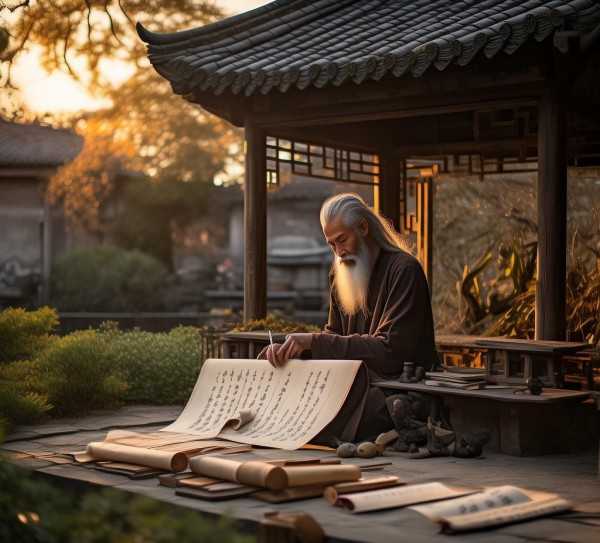
《醉翁亭记》是北宋著名文学家欧阳修创作的一篇脍炙人口的散文,收录于其文集《欧阳文忠公文集》之中,这篇散文以作者游历醉翁亭的经历为线索,抒发了作者对自然美景的热爱以及对人生哲理的深刻思考,以下是对《醉翁亭记》原文及其翻译的详细解读与赏析。
原文:
《醉翁亭记》
环滁皆山也,其西南诸峰,林壑尤美,望之蔚然而深秀者,琅琊也,山行六七里,渐闻水声潺潺,而泻出于两峰之间者,酿泉也,酿泉之上,其下临溪,溪水西流,欲入而北,故从西南来者,皆曰:“欲入而北。”既至酿泉,所谓“酿泉”者,盖泉源出石,泠泠作响,而泻出于两峰之间者,是为酿泉。
泉而酒也,酒而人亦醉,故曰:“醉翁之意不在酒,在乎山水之间也。”山水之乐,得之心而寓之酒也。
若夫日出而林霏开,云归而岩穴暝,晦明变化者,山间之朝暮也,野芳发而幽香,佳木秀而繁阴,风霜高洁,水落而石出者,山间之四时也,朝而往,暮而归,四时之景不同,而乐亦无穷也。
至于负者歌于途,行者休于树,前者呼,后者应,伛偻提携,往来而不绝者,滁人游也,临溪而渔,溪深而鱼肥,酿泉为酒,泉香而酒洌,山肴野蔌,杂然而前陈者,太守宴也,宴酣之乐,非丝非竹,射者中,弈者胜,觥筹交错,起坐而喧哗者,众宾欢也,苍颜白发,颓然乎其间者,太守醉也。
翻译:
A Record of the Drunken Old Man's Pavilion
Surrounded by mountains, Lüchi is a land of extraordinary beauty. The peaks in the southwest, with their lush forests and ravines, are particularly charming. The majestic and lush scenery visible from a distance is that of Langya Mountain. Walking for six or seven miles along the mountain path, one gradually hears the sound of running water, which gushes out between two peaks. This is the source of the Wine Spring. Above the spring, below the river, the stream flows westward, desiring to enter and then turn north, hence those coming from the southwest all say, "Desiring to enter and then turn north." When you reach the Wine Spring, the spring, said to be the Wine Spring, emerges from the stone, with a cold, clear sound, and gushes out between the two peaks, forming the Wine Spring.
The spring is like wine, and the wine makes people drunk, thus the saying, "The old man's intention is not in the wine, but in the scenery between mountains and rivers." The joy of mountains and rivers is felt in the heart and expressed through wine.
As for the sun rising and the mist in the forest clearing, the clouds returning and the cave darkening, the changes of light and dark, these are the morning and evening in the mountains. The wild flowers bloom and emit a fragrant scent, the fine trees flourish and provide dense shade, the air is clear and clean with the frost and snow, and the water recedes to reveal the stones, these are the four seasons in the mountains. Go in the morning and return in the evening; the scenery of the four seasons is different, and the joy is endless.
As for those carrying loads singing on the road, those walking resting under the trees, the one calling out, the other responding, the elderly stooping, the children being carried, the continuous coming and going, these are the people of Lüchi enjoying a picnic. Fishing by the river, the water deep and the fish fat, the Wine Spring producing wine, the spring fragrant and the wine clear, the mountainous delicacies and wild vegetables spread out before them, these are the banquets of the governor. The joy of the banquet is not from silk or bamboo music, but when the archers hit the target, the players win, cups and chopsticks clinking, rising and sitting, shouting and laughing, these are the joyful guests. The ancient-looking man with white hair, relaxed among them, is the governor who is drunk.
The old man's intention is not in the wine, but in the scenery between mountains and rivers. The joy of mountains and rivers is felt in the heart and expressed through wine.
赏析:
《醉翁亭记》一文,以山水为背景,通过对醉翁亭周围环境的描绘,展现了作者对自然美景的热爱,文章开头即以“环滁皆山也”点明地点,随后通过“西南诸峰”、“酿泉”等景物的描写,营造出一种幽静、秀美的意境。
在翻译部分,译者力求保持原文的韵味和意境,用简洁、流畅的语言传达了作者的思想感情。“泉而酒也,酒而人亦醉,故曰:‘醉翁之意不在酒,在乎山水之间也。’”这句话的翻译,既传达了原文的意思,又保留了原文的韵律美。
文章后半部分,作者通过对山水景色的描绘,引出对人生哲理的思考,日出、云归、野芳、佳木等自然景物的变化,象征着人生的起伏和变化,作者通过这些自然景物的描写,表达了自己对人生的感悟:“朝而往,暮而归,四时之景不同,而乐亦无穷也。”
在翻译中,译者也注意到了这一点,通过对“野芳发而幽香,佳木秀而繁阴,风霜高洁,水落而石出者,山间之四时也”的翻译,传达了作者对自然景物的赞美,以及对人生哲理的思考。
《醉翁亭记》一文,通过对自然美景的描绘和对人生哲理的思考,展现了作者超脱世俗、热爱自然的情怀,原文与翻译相互映衬,使得这篇散文更具艺术魅力和思想深度。



